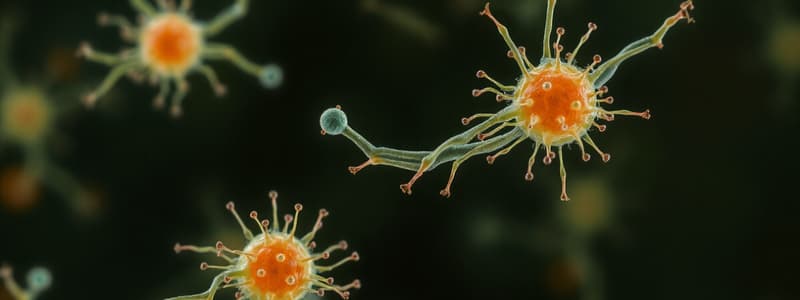Podcast
Questions and Answers
Which of the following statements correctly describes prokaryotes?
Which of the following statements correctly describes prokaryotes?
- They are complex organisms that can perform photosynthesis.
- They include viruses and unicellular algae.
- They possess a nucleus and multiple organelles.
- They are simple organisms with no nucleus or organelles. (correct)
Which group of organisms is classified as eukaryotes?
Which group of organisms is classified as eukaryotes?
- Bacteria
- Fungi, protozoa, and unicellular algae (correct)
- Viruses
- Archaea
What distinguishes viruses from prokaryotes and eukaryotes?
What distinguishes viruses from prokaryotes and eukaryotes?
- Viruses possess organelles for reproduction.
- Viruses are classified within the prokaryotic domain.
- Viruses have complex cellular structures.
- Viruses lack cellular structure entirely. (correct)
Which of the following characteristics is NOT true for prokaryotes?
Which of the following characteristics is NOT true for prokaryotes?
Which of the following statements regarding microbial organisms is correct?
Which of the following statements regarding microbial organisms is correct?
Flashcards
Prokaryotes
Prokaryotes
Simple organisms lacking a nucleus and organelles.
Eukaryotes
Eukaryotes
More complex organisms with cells containing a nucleus and organelles.
Bacteria
Bacteria
A group of single-celled organisms, lacking a nucleus and organelles, considered prokaryotes.
Microbial Eukaryotes
Microbial Eukaryotes
Signup and view all the flashcards
Viruses
Viruses
Signup and view all the flashcards
Study Notes
Microbial Organisms: Prokaryotes and Eukaryotes
- Microorganisms fall into two primary groups: prokaryotes and eukaryotes.
- Prokaryotes lack a nucleus and organelles, while eukaryotes have both.
- Bacteria are prokaryotic organisms distinguished by their cellular properties.
- Fungi, protozoa, and unicellular algae are eukaryotic, possessing a nucleus and organelles within their cells.
- Viruses are neither prokaryotic nor eukaryotic due to their structural simplicity and unique characteristics.
Studying That Suits You
Use AI to generate personalized quizzes and flashcards to suit your learning preferences.
Description
Explore the fascinating world of microorganisms through this quiz focusing on prokaryotes and eukaryotes. Understand the key differences between these two groups, including their cellular structures and examples. Test your knowledge on bacteria, fungi, protozoa, and viruses in a fun and engaging way.




